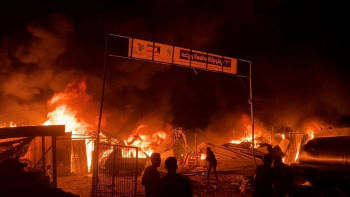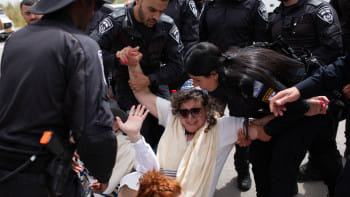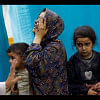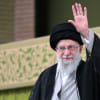The power of words: Nikki Haley’s call to ‘finish them’ off

Former US Ambassador to the UN Nikki Haley's recent visit to Israel ignited controversy when she left a message on an artillery shell, boldly declaring, "Finish Them!" This act, shared via social media, sparked debate and criticism, with some condemning it as a blatant endorsement of violence.
Haley's use of the phrase "Finish Them" is not surprising, considering her previous statements regarding Hamas and the ongoing conflict in Gaza. However, inscribing it on a physical object associated with warfare raised significant concerns and drew widespread attention online.
Haley's visit underscores the complexities and sensitivities surrounding the Israeli-Palestinian conflict, as well as the divergent perspectives on how to address and resolve the ongoing violence and humanitarian crisis in Gaza. During her visit, Haley also visited locations impacted by recent conflict, including the site of the Supernova music festival and Kibbutz Nir Oz in southern Israel, which had been targeted in a surprise attack by Hamas. In an Instagram post, Haley highlighted the toll the conflict has taken on Israeli civilians, emphasising the trauma and loss experienced by the community; the same sympathy seemed absent for the many innocent Palestinian civilians on the other end of Israeli brutality.
Dehumanisation and the Israeli-Palestinian conflict
The dehumanisation of Palestinians, often rooted in racial and religious biases, is a deeply troubling aspect of the Israeli-Palestinian conflict. This dehumanisation perpetuates harmful stereotypes and narratives that justifies violence, discrimination, and the denial of basic rights to Palestinians. It is important to acknowledge the intersectionality of this issue, including its ties to global Islamophobia.
This is reinforced through media portrayals, political rhetoric, and educational curricula, which contribute to negative perceptions of Palestinians and legitimise discriminatory practices. The Israeli occupation of Palestinian territories exacerbates the dehumanisation of Palestinians by creating a power imbalance that reinforces stereotypes of Palestinians as "the other" and justifies oppressive policies and practices. Palestinians are subjected to systemic discrimination, land confiscation, home demolitions, and arbitrary detention, further marginalising their humanity and rights.
Often linked to colonial narratives that frame their resistance to occupation as illegitimate and violent, Palestinians are portrayed as obstacles to peace and security, despite Israel being a nation that has repeatedly not abided by international law. This colonial mindset perpetuates the erasure of Palestinian history, culture, and identity, denying them their agency and right to self-determination.
Connected to broader trends of Islamophobia, which demonises Muslims and portrays Islam as inherently violent and incompatible with Western values, this Islamophobic discourse contributes to the marginalisation and vilification of Palestinians, many of whom are Muslim, and further ignores the Palestinian Christians also being impacted by Israeli occupation. Addressing the dehumanisation of Palestinians requires challenging racist and Islamophobic narratives, advocating for the rights and dignity of all Palestinians, and promoting empathy, understanding, and solidarity across communities. It also necessitates holding accountable those responsible for perpetuating discrimination and violence against Palestinians, whether through policies, media representation, or public discourse.
Haley's visit came amid heightened tensions in the region, particularly following Israel's latest military operation in Rafah, which resulted in civilian casualties. Israeli Prime Minister Benjamin Netanyahu described these deaths as a "tragic mistake," yet the incident underscores the devastating impact of the ongoing conflict on Palestinian civilians. Furthermore, Haley's visit coincides with increased pressure on the US to intervene and curb Israel's military actions in Gaza. US President Joe Biden had previously warned of withholding weapons shipments if Israel pursued a major invasion of Rafah, a move that drew criticism from Haley during her visit. Haley argued that the US should unequivocally support Israel and refrain from dictating its military strategy.
The power of words extends beyond their ability to inspire and persuade; they can also have significant consequences, especially when used to promote violence or incite hostility. Through social media platforms and online forums, exposure to such language and extremist narratives can radicalise individuals, emboldening them to take violent action. We have seen how this happened in the horrifying cases of the Christchurch shooting in 2019 and the Buffalo shooting. In the near future, we might have to witness consequences of Haley's aggressive sentiments towards Palestine, as some may be susceptible to radicalisation and may carry out attacks motivated by the catchphrase.
Political messaging and the shaping of public opinion
A well-crafted speech can inspire and mobilise masses, galvanising support for a cause or a leader. Think of Martin Luther King Jr's "I Have a Dream" speech, which became a rallying cry for the Civil Rights Movement. Political leaders use speeches to communicate their policy agendas, outlining their vision for the future and garnering public support for their initiatives.
However, they can also stir violence. Enoch Powell's "Rivers of Blood" speech, delivered in April 1968, stands as one of the most infamous speeches in British political history. Its impact was profound, stirring up intense controversy and contributing to social divisions that reverberated for years to come. In his speech, Powell warned of what he saw as the dangers of unchecked immigration, particularly from Commonwealth countries, to the UK. His speech was met with both fervent support and vehement condemnation. While some praised him for speaking out on an issue they perceived as being ignored by mainstream politicians, others accused him of promoting racism and xenophobia. The speech triggered widespread public debate, violence, and protests, with many condemning Powell's views as inflammatory and divisive.
The "Rivers of Blood" speech remains a contentious and controversial topic in British politics and public discourse. It serves as a cautionary tale about the power of inflammatory rhetoric to stoke social tensions and incite violence. Despite its historical significance, Powell's speech continues to be referenced in discussions about immigration, race relations, and the responsibilities of political leaders in addressing sensitive issues.
In essence, speeches and words are potent tools in the political arena, capable of shaping public opinion, mobilising support, and driving policy outcomes. People in positions of power, like those in the US government, should be acutely aware of how they use their words and actions. As we have seen time and again, incendiary speech can have horrifying consequences. The effectiveness of speeches in whatever form lies in their ability to connect and unite audiences-emotionally, intellectually, and ideologically—ultimately shaping the course of political discourse and action for the better of everyone.
Salwah Chowdhury is a bookworm and a toddler mom, working in an NGO. She loves the rush of thinking, reading and writing, and takes on freelance projects every now and then. Follow her on Instagram @salwah_chowdhury and share any book recommendations or your thoughts on the article.
Views expressed in this article are the author's own.
Follow The Daily Star Opinion on Facebook for the latest opinions, commentaries and analyses by experts and professionals. To contribute your article or letter to The Daily Star Opinion, see our guidelines for submission.

 For all latest news, follow The Daily Star's Google News channel.
For all latest news, follow The Daily Star's Google News channel. 











Comments